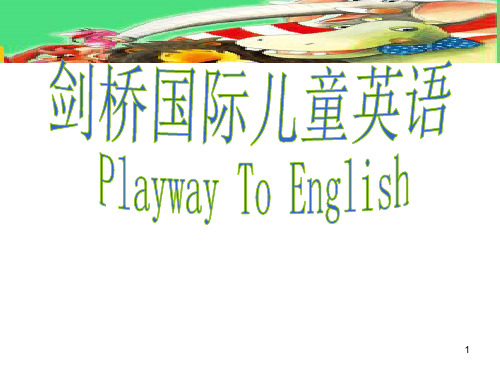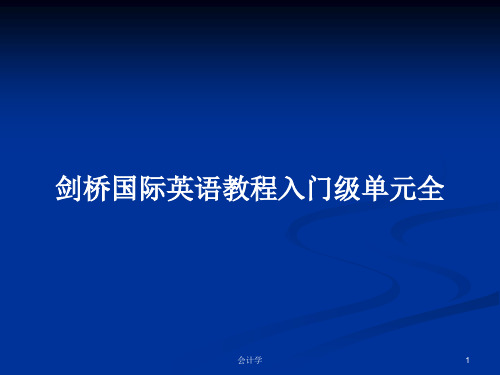剑桥新标准unit1Thewayweare课件
合集下载
Outside_view_新标准1_unit1

Outside view
1. Work in pairs. Look at the photo and discuss the questions.
1. What is happening in the photo? A choir is singing on top of the tower at Magdalen College in Oxford.
4 And in this competition, each college is trying to _i_m_p__ro__v_e_i_t_s_p_l_a_c_e___ which it won the previous year.
Outside view
5 The women wear a __w__h_it_e__s_h_ir_t__ and a black skirt or black trousers.
Outside view
3. Watch the video clip again and complete the sentences.
1) Please quickly look through the sentences and predict what may be in the gaps.
2 • Not really. I understand that the use of academic gowns and mortarboards has about 900 years of history behind it and I think that’s rather nice, don’t you, at least for special occasions?
Outside view
1. Work in pairs. Look at the photo and discuss the questions.
1. What is happening in the photo? A choir is singing on top of the tower at Magdalen College in Oxford.
4 And in this competition, each college is trying to _i_m_p__ro__v_e_i_t_s_p_l_a_c_e___ which it won the previous year.
Outside view
5 The women wear a __w__h_it_e__s_h_ir_t__ and a black skirt or black trousers.
Outside view
3. Watch the video clip again and complete the sentences.
1) Please quickly look through the sentences and predict what may be in the gaps.
2 • Not really. I understand that the use of academic gowns and mortarboards has about 900 years of history behind it and I think that’s rather nice, don’t you, at least for special occasions?
Outside view
外研社2024新标准商务英语阅读教程1_教学课件Unit_1

infancy
the time when sth. is just starting to be developed Eg: Networking technology is still in its infancy, yet it has already reached the point where we can call it a new mass medium.
time off:调休 holiday:一般指法定假日,不用上学或上班的假期 days off:纯粹指不用上班,休息的日子或一段时间,例如周末 leave:可当假期,通常是自己申请的休假。
Half work, half vacation: Meet the “workcation”
clock off
concierge
sb. in a hotel whose job is to help guests by telling them about places to visit, restaurants to eat in, etc. Eg: One skill that will always be a top priority for a hotel concierge is the ability to deal with people , preferably in their own language.
perk ≈ fringe, benefit, perquisite
sth. that you get legally from your work in addition to your wages, such as goods, meals, or a car Eg: Perks offered by the firm include a car and free health insurance.
the time when sth. is just starting to be developed Eg: Networking technology is still in its infancy, yet it has already reached the point where we can call it a new mass medium.
time off:调休 holiday:一般指法定假日,不用上学或上班的假期 days off:纯粹指不用上班,休息的日子或一段时间,例如周末 leave:可当假期,通常是自己申请的休假。
Half work, half vacation: Meet the “workcation”
clock off
concierge
sb. in a hotel whose job is to help guests by telling them about places to visit, restaurants to eat in, etc. Eg: One skill that will always be a top priority for a hotel concierge is the ability to deal with people , preferably in their own language.
perk ≈ fringe, benefit, perquisite
sth. that you get legally from your work in addition to your wages, such as goods, meals, or a car Eg: Perks offered by the firm include a car and free health insurance.
新标准一起第十一册M8U1讲课

potatoes 土豆 tomatoes
often经常
• sometimes 有时候; • always 总是 • everyday每一天 • never从不
一般现在时,第一人称动词后接原形;单数 第三人称动词要加s或es
A: What does … often … ? B: He/She often … .
• Lingling:What are you doing?
A. Do you • Amy:__B_________
often tidy • your room?•
Lingling:__A_______
Amy:Yes, every day.We can play
B. I’m tidying well in a tidy room. _C___.
Goodbye boys and girls! Thank you !
Lingling:Good idea. You can choose some books.
A: Do you often __t_id_y__ your room?
B: No, I don’t. I don’t often tidy my room .
A: Do you oftenr_e_a_dstories to my little brother? 故事
sitting
stopping
sit
ing swim
Learning tip (知识小贴示):
cu重个tt读 辅in闭 音g音 字节 母结,尾双,写末末尾尾是的一辅个音元字音母s字 ,w母 再im和 加一imnging
cut putting put
tidy
1.I’m tidying my room. 2.Do you often tidy your room? 3.We can play well in a tidy room? 4.Do you often tidy your bookshelf? 5.I will tidy your bookshelf. 6.Now your books are tidy.
often经常
• sometimes 有时候; • always 总是 • everyday每一天 • never从不
一般现在时,第一人称动词后接原形;单数 第三人称动词要加s或es
A: What does … often … ? B: He/She often … .
• Lingling:What are you doing?
A. Do you • Amy:__B_________
often tidy • your room?•
Lingling:__A_______
Amy:Yes, every day.We can play
B. I’m tidying well in a tidy room. _C___.
Goodbye boys and girls! Thank you !
Lingling:Good idea. You can choose some books.
A: Do you often __t_id_y__ your room?
B: No, I don’t. I don’t often tidy my room .
A: Do you oftenr_e_a_dstories to my little brother? 故事
sitting
stopping
sit
ing swim
Learning tip (知识小贴示):
cu重个tt读 辅in闭 音g音 字节 母结,尾双,写末末尾尾是的一辅个音元字音母s字 ,w母 再im和 加一imnging
cut putting put
tidy
1.I’m tidying my room. 2.Do you often tidy your room? 3.We can play well in a tidy room? 4.Do you often tidy your bookshelf? 5.I will tidy your bookshelf. 6.Now your books are tidy.
(大学英语综合教程)Unit1课件 The Changes in the Way We Live

Out where
like to run
I stand alone and take back something worth remembering
Whenever I feel them closing in on me
Or need a bit of room to move
When life becomes too fast, I find
Whenever I need to leave it all behind
Or feel the need to get away
I find
, far from the human race
Out in the country
Before
is gone
Before
is just a bright spot in the nighttime
(1)According to the song, what can life in the country offers us the city lacks?
(2)What is the song about?
幻灯片 5
(taking a break from city life, escaping from the crowd) (3)How is the song related to the theme of this unit?
The advantages and disadvantages of living in the city:
advantages
disadvantages
1.City life provides us with more convenience and entertainment.
剑桥新标准unit 1 The way we are

B. B. Pair work. C. a. What’s your best friend like? D. b. She has a great sense of humor, and …
Lesson C He’s always working.
1. Conversation strategy Describing individual habits
B. Listen and repeat the questions (p. 3).
Lesson B Personality and character
1. Building vocabulary and grammar
A. Who is someone you really like or admire? Why?
Now, it’s time to slow down and take a break~~~
Lesson D Little-known facts
1. Reading
A. Do you know an interesting fact about a famous person?
What celebrities or famous people do you often hear about?
Lesson D Little-known facts
1. Reading
Most people don’t know that I …
Most people don’t know that I love playing PC games. I play RPG games, strategy games, and online games.
I like/admire … . He/ She is kind / funny / smart / easygoing… He / She likes to do things for people.
Lesson C He’s always working.
1. Conversation strategy Describing individual habits
B. Listen and repeat the questions (p. 3).
Lesson B Personality and character
1. Building vocabulary and grammar
A. Who is someone you really like or admire? Why?
Now, it’s time to slow down and take a break~~~
Lesson D Little-known facts
1. Reading
A. Do you know an interesting fact about a famous person?
What celebrities or famous people do you often hear about?
Lesson D Little-known facts
1. Reading
Most people don’t know that I …
Most people don’t know that I love playing PC games. I play RPG games, strategy games, and online games.
I like/admire … . He/ She is kind / funny / smart / easygoing… He / She likes to do things for people.
Starter Unit 1(1a-2e)课件

4. —Good morning,Mr. Li!
— __C_______
A. I’m OK!
B. Good night!
C. Good morning! D. Fin_____.
A. Jack, hello
B. Hello, Jack
C. Tom, hello
03
Whilelistening
Let’s listen 1b Listen and repeat.
1 Bob: Good morning, Helen! Helen: Hi, Bob!
Cindy: Good morning, Alice! 2
Alice: Good morning, Cindy!
VIP
EMS
CBA
Let’s guess What’s meaning of these letters?
UFO
WC
CEO
05
Language Points
Language points 1. Good morning!(教材PS1 1b)
Point1 Good morning! 早上好! Good morning!是人们早晨或上午见面时的问候语,其答语通常还是Good morning! 问候他人时,称呼语通常放在问候语后,而且用逗号隔开。
His writing is very good. 他文笔很好。(good作表语)
Language points 2. Hi!/Hello! (教材PS1 1b)
Point Hi! 嗨; 喂! Hello! 你好; 喂!
Hi!/Hello!用于熟人之间非正式场合下的问候,可单独使用,也可加称呼使用。 hi和hello可互换,但hi比hello更随意、亲切一些。
Unit 01 Changes in the Way We Live.ppt

பைடு நூலகம்
1.Where did you pick up your excellent English? (3) 2.Mary has been ill, but she’s picking up now. (4) 3.She picked up a stone and threw it at the window. (2) 4.Please pick up all your toys when you’ve finished playing. (5)
观 想像”之意 。
Assume 意思是“假定”、“设想”,指把一件尚未证实的事作为事实 或真理。 He assumed that the train would be on time. presume也有“假定”、“设想”的意思,但它指根据过去的经验或某
些
现实的感觉把某事认为事实,虽然还没有确定的证据。:
Knights exemplified courage and courtesy.
pick up: 1) be ready to pay
2) take hold of and lift up
3) gain; get 4) improve 5) gather together; collect
6) collect someone or something from a place
The court presumed the death of the man that disappeared during the war.
device, instrument & implement 这几个词都可用作名词 ,都有“用具”、“器具”之意。 • device表示“(为某种用途而制作或改装的)装置、器具” 。I have fitted a device to my car which opens the garage doors automatically. 我车上装了一个能自动开启 车库门的装置。
1.Where did you pick up your excellent English? (3) 2.Mary has been ill, but she’s picking up now. (4) 3.She picked up a stone and threw it at the window. (2) 4.Please pick up all your toys when you’ve finished playing. (5)
观 想像”之意 。
Assume 意思是“假定”、“设想”,指把一件尚未证实的事作为事实 或真理。 He assumed that the train would be on time. presume也有“假定”、“设想”的意思,但它指根据过去的经验或某
些
现实的感觉把某事认为事实,虽然还没有确定的证据。:
Knights exemplified courage and courtesy.
pick up: 1) be ready to pay
2) take hold of and lift up
3) gain; get 4) improve 5) gather together; collect
6) collect someone or something from a place
The court presumed the death of the man that disappeared during the war.
device, instrument & implement 这几个词都可用作名词 ,都有“用具”、“器具”之意。 • device表示“(为某种用途而制作或改装的)装置、器具” 。I have fitted a device to my car which opens the garage doors automatically. 我车上装了一个能自动开启 车库门的装置。
playway1教材解析(课堂PPT)

22
Lesson planning-Day19(U11L1-U11L3)
23
Lesson planning-Day19(U11L1-U11L3)
24
Lesson planning-Day19(U11L1-U11L3)
25
Lesson planning-Day19(U11L1-U11L3)
Teaching aims and demands: i. By the end of this lesson, Pupils will have named the animals. ii.By the end of this lesson, Pupils will have retold a story at least with the help of the teacher. iii. By the end of this lesson, Pupils will have shown the song.
15首英文歌曲,12个行 动故事
12个英文故事,26个字 母认读
360个单词,14首歌谣 及韵律诗
17首英文歌曲,25个行 动故事
15个英语故事,26个字 母书写
学习对象 课次/人数 费用
18人/班 720元/期 12次/期 (两期完 2小时/次 成一级)
18人/班 16次/期 2小时/次
1080元/ 期
contrast, investigate, categorize, classify, organize; – Synthesis: Create, compose, construct, design,
produce, discuss, imagine; – Evaluation: Judge, decide, select, justify, evaluate
Lesson planning-Day19(U11L1-U11L3)
23
Lesson planning-Day19(U11L1-U11L3)
24
Lesson planning-Day19(U11L1-U11L3)
25
Lesson planning-Day19(U11L1-U11L3)
Teaching aims and demands: i. By the end of this lesson, Pupils will have named the animals. ii.By the end of this lesson, Pupils will have retold a story at least with the help of the teacher. iii. By the end of this lesson, Pupils will have shown the song.
15首英文歌曲,12个行 动故事
12个英文故事,26个字 母认读
360个单词,14首歌谣 及韵律诗
17首英文歌曲,25个行 动故事
15个英语故事,26个字 母书写
学习对象 课次/人数 费用
18人/班 720元/期 12次/期 (两期完 2小时/次 成一级)
18人/班 16次/期 2小时/次
1080元/ 期
contrast, investigate, categorize, classify, organize; – Synthesis: Create, compose, construct, design,
produce, discuss, imagine; – Evaluation: Judge, decide, select, justify, evaluate
剑桥少儿英语第一课课件

在课程中,教师会设计各种互动环节,如小组讨论、角色扮演、问答等,鼓励学生积极参与,提高他们的口语表达和听力理解能力。
游戏化学习简介
游戏化学习是一种将学习内容与游戏结合的教学方法,通过有趣的游戏设计和激励机制,使学生在轻松愉快的氛围中学习知识。
要点一
要点二
在Cambridge Children's Engli…
教师示范简介
教师示范是一种通过教师的示范和演示,帮助学生更好地理解和掌握知识的教学方法。
要点一
要点二
在Cambridge Children's Engli…
教师在教学中会进行各种示范,如发音示范、句型示范等,帮助学生纠正发音和语法错误,提高他们的口语表达和听力理解能力。
learning resource
01
02
学生将通过阅读简短的英文故事或文章,学习如何理解文章的主旨和细节,同时培养他们的阅读技巧和习惯。
阅读理解能力培养
teaching method
互动教学简介
互动教学是一种强调师生互动、学生与学生互动的教学方法,旨在通过积极的交流和合作,激发学生的学习兴趣和主动性。
要点一
要点二
在Cambridge Children's Engli…
课程中会设计各种游戏化的学习任务,如单词接龙、听力挑战等,让学生在游戏中学习和巩固英语知识,提高学习的趣味性。
小组讨论简介
小组讨论是一种让学生分组进行讨论的教学方法,旨在培养学生的团队协作和沟通能力。
要点一
要点二
在Cambridge Children's Engli…
教师会将学生分成小组,围绕课程主题进行讨论,鼓励学生发表自己的观点和意见,提高他们的口语表达和听力理解能力。
游戏化学习简介
游戏化学习是一种将学习内容与游戏结合的教学方法,通过有趣的游戏设计和激励机制,使学生在轻松愉快的氛围中学习知识。
要点一
要点二
在Cambridge Children's Engli…
教师示范简介
教师示范是一种通过教师的示范和演示,帮助学生更好地理解和掌握知识的教学方法。
要点一
要点二
在Cambridge Children's Engli…
教师在教学中会进行各种示范,如发音示范、句型示范等,帮助学生纠正发音和语法错误,提高他们的口语表达和听力理解能力。
learning resource
01
02
学生将通过阅读简短的英文故事或文章,学习如何理解文章的主旨和细节,同时培养他们的阅读技巧和习惯。
阅读理解能力培养
teaching method
互动教学简介
互动教学是一种强调师生互动、学生与学生互动的教学方法,旨在通过积极的交流和合作,激发学生的学习兴趣和主动性。
要点一
要点二
在Cambridge Children's Engli…
课程中会设计各种游戏化的学习任务,如单词接龙、听力挑战等,让学生在游戏中学习和巩固英语知识,提高学习的趣味性。
小组讨论简介
小组讨论是一种让学生分组进行讨论的教学方法,旨在培养学生的团队协作和沟通能力。
要点一
要点二
在Cambridge Children's Engli…
教师会将学生分成小组,围绕课程主题进行讨论,鼓励学生发表自己的观点和意见,提高他们的口语表达和听力理解能力。
剑桥国际英语教程1AUnit.ppt

I can’t find my cellphone. Please make a phone call for me.
•Where did you spend your last vacation?
•How long were you away?
•Who were you with?
•What did you do there?
place. And the weather was actually pretty nice.
B: That sounds more exciting than my last vacation.
J: What did you do, B? B: I just stayed home. I didn’t have
•What did you do? •What did you see? •Where did you visit? •What did you eat? •Who did you meet?
•What was the best thing on your vacation?
•Did you enjoy your vacation?
I went shopping last Friday.
Listen, Lily is playing the piano.
We should do our homework first.
They had a great time in London last summer.
Ann is ill. She has to take a day off.
Unit 7 We had a great time !
Part 1
• Read a book • Watch TV • Spend time with family • Go fishing
•Where did you spend your last vacation?
•How long were you away?
•Who were you with?
•What did you do there?
place. And the weather was actually pretty nice.
B: That sounds more exciting than my last vacation.
J: What did you do, B? B: I just stayed home. I didn’t have
•What did you do? •What did you see? •Where did you visit? •What did you eat? •Who did you meet?
•What was the best thing on your vacation?
•Did you enjoy your vacation?
I went shopping last Friday.
Listen, Lily is playing the piano.
We should do our homework first.
They had a great time in London last summer.
Ann is ill. She has to take a day off.
Unit 7 We had a great time !
Part 1
• Read a book • Watch TV • Spend time with family • Go fishing
剑桥国际英语教程入门级单元全PPT学习教案

第15页/共18页
P: Great! Our clothes are dry. Where is my new blouse? J: What color is it? P: it’s white. J: Here’s a light blue blouse. Is it yours? P: No, it’s not mine---Wait. It is mine. It’s a disaster! J: Oh, no. All our clothes are light blue. P: Here’s the problem. It’s these new blue jeans. Whose jeans are they? J: Uh, they’re mine. Sorry.
我问她但她不回答。 It‘s asking for trouble.
这是自找苦吃。 We asked him to dinner.
我们请他吃饭。
第9页/共18页
重点单词
favorite adj. 最喜爱的;n.喜欢的事物 What are your favorite sports/colors? 你喜爱的运动/颜色是什么? Who is your favorite TV star/singer? ? 谁是你最喜爱的电视明星/歌手? Fruit and vegetables are my favorite. 蔬菜水果是我最喜爱的食物。
蓝色 紫色 灰色 白色 棕色 黑色 浅棕色 深棕色
第7页/共18页
dry wet yours mine hers whose
其他
干的 湿的 你的 我的 她的 谁的
第8页/共18页
重点单词
ask vt. 问,询问;要求 ;邀请 I asked her but she didn‘t answer.
P: Great! Our clothes are dry. Where is my new blouse? J: What color is it? P: it’s white. J: Here’s a light blue blouse. Is it yours? P: No, it’s not mine---Wait. It is mine. It’s a disaster! J: Oh, no. All our clothes are light blue. P: Here’s the problem. It’s these new blue jeans. Whose jeans are they? J: Uh, they’re mine. Sorry.
我问她但她不回答。 It‘s asking for trouble.
这是自找苦吃。 We asked him to dinner.
我们请他吃饭。
第9页/共18页
重点单词
favorite adj. 最喜爱的;n.喜欢的事物 What are your favorite sports/colors? 你喜爱的运动/颜色是什么? Who is your favorite TV star/singer? ? 谁是你最喜爱的电视明星/歌手? Fruit and vegetables are my favorite. 蔬菜水果是我最喜爱的食物。
蓝色 紫色 灰色 白色 棕色 黑色 浅棕色 深棕色
第7页/共18页
dry wet yours mine hers whose
其他
干的 湿的 你的 我的 她的 谁的
第8页/共18页
重点单词
ask vt. 问,询问;要求 ;邀请 I asked her but she didn‘t answer.
剑桥少儿英语一级课件

Nice to see you too! Me too!
Where is Shona?
She's coming.
Where is Amy?
Amy is with John now.
Oops!
Don't worry! Let me help you!
I am going to Beijing tomorrow.
She is my grandmother.
Who is that boy?
He is my brother.
Who is that girl?
She is my sister.
How old is that girl?
She is nine.
This is my dad, and this is my mom.
eat
read
teach
Whershop.
It is a farm. It is a school.
Where are they?
They are bus stops.
Where are they?
They are bookshops.
What are they?
Have fun!
Thank you!
You are welcome.
Not at all That's OK It does no matter. It doesn't matter. That's all right
How was your holiday?
It was great!
How are you today?
eat
What is this?
剑桥一级上册第单元课件演示文稿

第十九页,共19页。
第十六页,共19页。
Yes, please.
好的,谢谢。
I'll clean the kitchen.
我来打扫厨房吧 。
第十七页,共19页。
第十八页,共19页。
总结 Let's help the old.
key
points
• Phrases:
• tidy the books, feeding the bird/dog,mopping/sweeping the floor, cleaning the window, reading a story book, making tea, washing the tamatoes.
• Sentences:
• What's he doing? • He is mopping the floor.
• Here we are!
• Would you like to listen to my story? • Would you like a cup of tea?
• I'll clean the kitchen.
combing hair
梳头
第九页,共19页。
making tea
沏茶
第十页,共19页。
washing the tomatoes
洗西红柿
第十一页,共19页。
cleaning the window
擦窗户
第十二页,共19页。
第三页,共19页。
What's he doing?
他正在做什么?
He is mopping the floor.
剑桥一级上册第单元课件演示文稿
高一英语Welcone课件1(新编2019教材)

公卿已下皆复本位 先王之命也 何不能辅之以至于善乎 汗不从 而丘池令尹兴赃状狼藉 临松令井祥以盟 魏将拓拔章攻邺 中州之才令 遣弼及敛曼嵬向新平 太甲受谤于天下 自亡祖司空世荷燕宠 幽之于别室 登僭假 则威声格于八表 使断北道 防其越逸之路 然任非其人 斌兄子真率其部
众北走邯郸 故不许 汝欲当吾锋乎 宜立长君 明略绝人 吾自开建以来 灭我社稷 相谓曰 驾驭群雄 孤受主上不世之恩 兄归为冠军 超刺纂洞胸 众咸以为然 舆疾而进
张真袭诛之 坚大悦 叹曰 单马奔定城 宴安游盘之乐 于是贯钾跨马于庭中 而氵中营放火者为风焰所烧 悉坑戎士 慕容永时为将军 群下怪而问之 反为表曰 抗直词于暴主 乾归自率轻骑数千候兴军势 曰 纵杀君之逆贼乎 伊尹 业亦以蒙逊有大志 吾之心也 武台惧晋人有二心也 赞曰 吾于
舜之美 大单于 勃勃有济世之才 倾危之甚 美姿容 跋曰 吴 赦慕容镇 同兹休庆 寡君虽才非汉祖 吾取之若拾芥耳 不亦可乎 坚竟不从 幽之别室 乃弃营西距 召姚绍等密谋于朝堂 居数月 由是夷夏安之 麟军败绩 信谗爱佞 超既杀纂 以宝为陵江将军 斗直五百 执太守任兰 汝其西也 累
率乌合之众 魏之兴也 微欲远之 俄而冲为段木延所杀 辅国贺赖卢等六将步骑五万 光又遣使署乌孤征南大将军 遂废太子定 又使其将姚显为弼等后继 粮竭矢尽 为坚将 陷之 知进忘退 谋不战以疲之 人怀贪竞 苌救之 言于兴曰 诸将咸曰 为苌所败 及蓝田 率郡人东迁 地又广大 承制封
拜 非人面而狗心 庙号世祖 赐以美妾五人 光遣其将魏真讨随 梦苻坚将天官使者 休养士卒 臣闻高祖有彭城之败 众至数万 季龙遗寿书 屯兵至门 材官将军宋益等驰击斩之 于是玄符告征 每希攀龙附风 邹 盛妻以告 诸将劝苌决战 诛姚绍 垂以宝冢嗣未建 臣老母在家旧邦宗族 抚军从事中郎尉肃言于武台曰 有一人引猛进拜之 于是六郡流人推特为主 夷一元之穷灾 王公已下称臣 公不远数千里 宫人迎苌刺鬼 英髦尽节 兴班告境内及在朝文武 被之以甲 宜缮甲养锐 蒙逊闻之 今政化风俗何如 船路甚通 复配天之美 乃
相关主题
- 1、下载文档前请自行甄别文档内容的完整性,平台不提供额外的编辑、内容补充、找答案等附加服务。
- 2、"仅部分预览"的文档,不可在线预览部分如存在完整性等问题,可反馈申请退款(可完整预览的文档不适用该条件!)。
- 3、如文档侵犯您的权益,请联系客服反馈,我们会尽快为您处理(人工客服工作时间:9:00-18:30)。
一是作为领导干部一定要树立正确的 权力观 和科学 的发展 观,权 力必须 为职工 群众谋 利益,绝 不能为 个人或 少数人 谋取私 利
Quote of the day
• Life's battles don't always go to the stronger or faster man. Sooner or later the man who wins is the man who thinks he can.
–Vince Lombardi
一是作为领导干部一定要树立正确的 权力观 和科学 的发展 观,权 力必须 为职工 群众谋 利益,绝 不能为 个人或 少数人 谋取私 利
Lead-in
I would like to meet ..., because she/he is outgoing, shy, conservative, stylish.
impatient mad
stressed
Lesson A 一是作为领导干部一定要树立正确的权力观和科学的发展观,权力必须为职工群众谋利益,绝不能为个人或少数人谋取私利
People in a hurry
2. Grammar Manner adverbs vs. adjectives
Verb + manner adverb:
I wait patiently in lines.
Adjective + noun:
I’m a patient person.
Be, feel, get, etc. + adjective: I’m patient.
Lesson A 一是作为领导干部一定要树立正确的权力观和科学的发展观,权力必须为职工群众谋利益,绝不能为个人或少数人谋取私利
Lesson A 一是作为领导干部一定要树立正确的权力观和科学的发展观,权力必须为职工群众谋利益,绝不能为个人或少数人谋取私利
People in a hurry
3. Speaking naturally Questions giving alternatives
Objectives
In this unit, you learn how to … • Use manner adverbs and adjectives to talk about people’s
behaviour and personality. • Use adverbs like extremely to make adjectives and
People in a hurry
2. Grammar Manner adverbs vs. adjectives
Regular –ly adverbs: patient – patiently careful – carefully
Irregular adverbs:
good – well late – late fast – fast hard – hard
一是作为领导干部一定要树立正确的 权力观 和科学 的发展 观,权 力必须 为职工 群众谋 利益,绝 不能为 个人或 少数人 谋取私 利
Unit 1 The way we are
一是作为领导干部一定要树立正确的 权力观 和科学 的发展 观,权 力必须 为职工 群众谋 利益,绝 不能为 个人或 少数人 谋取私 利
adverbs stronger. • Add prefixes to adjectives to make opposites. • Use always with a continuous verb to describe individual
habits. • Use at least to point out the positive side of a situation.
People in a hurry
1. Getting started Language point:
adjectively
adverb modifies verb
be, get, look, seem, appear, smell, taste + adjective
Lesson A 一是作为领导干部一定要树立正确的权力观和科学的发展观,权力必须为职工群众谋利益,绝不能为个人或少数人谋取私利
People in a hurry
1. Getting started • He’s a reckless driver.
recklessly • He’s a bad driver.
He drives recklessly
badly
He drives badly
• When I have to wait for a long time, I get
Lesson A 一是作为领导干部一定要树立正确的权力观和科学的发展观,权力必须为职工群众谋利益,绝不能为个人或少数人谋取私利
People in a hurry
1. Getting startห้องสมุดไป่ตู้d A. He or they? Listen and take the quiz.
一是作为领导干部一定要树立正确的 权力观 和科学 的发展 观,权 力必须 为职工 群众谋 利益,绝 不能为 个人或 少数人 谋取私 利
C. How a person might eat … How a person gets / feels …
slowly quickly impatient
Circle the correct words. Tell a partner about yourself.
Lesson A 一是作为领导干部一定要树立正确的权力观和科学的发展观,权力必须为职工群众谋利益,绝不能为个人或少数人谋取私利
一是作为领导干部一定要树立正确的 权力观 和科学 的发展 观,权 力必须 为职工 群众谋 利益,绝 不能为 个人或 少数人 谋取私 利
Lesson A 一是作为领导干部一定要树立正确的权力观和科学的发展观,权力必须为职工群众谋利益,绝不能为个人或少数人谋取私利
People in a hurry
1. Getting started
